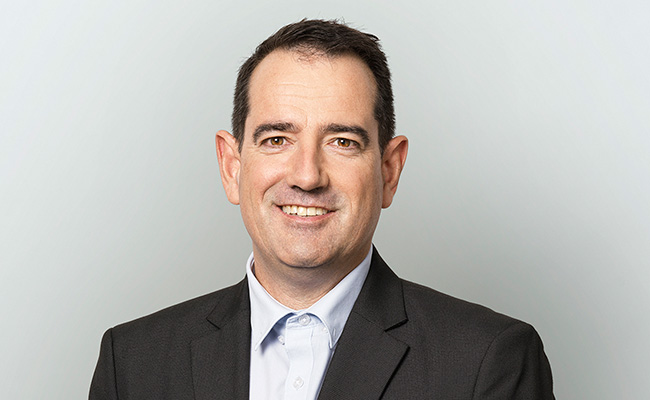Just one year into his four-year contract and Naspers/Prosus CEO Fabricio Bloisi is well on the way to scoring his special once-off “moonshot” award of $100m. And in a tale that will be all too familiar to Naspers/Prosus shareholders it is entirely down to the performance of Chinese wunderkind Tencent.
The Prosus share price is up 57% over the past year while Naspers has advanced 44% – both dragged along by the 47% increase in Tencent’s share price.
Of course, the $100m isn’t in the bag yet. The combined Prosus/Naspers share price must have more than doubled between June 2024 and June 2028. It’s halfway there now, which means it must pull off the same sort of performance over the next three years; and then – according to the “moonshot” agreement – that level must be maintained for 12 months, and this must represent a better performance than 50% of its global peers.
With half the four-year market-cap target already in the bag, that key challenge looks very doable. But check out Tencent’s share price performance over the past 10 years and it’s safe to say that over the short to medium term nothing can be taken for granted. It’s not just the volatility of the tech industry; it’s the volatility of regulatory attitudes in China.
The share price has more than halved in recent years. Between early 2021 and July 2024, which was when Bloisi was appointed Naspers CEO, the Tencent share price went from HK$719 to HK$397, reaching a low of HK$191 in October 2022. And at every step it has dragged the Naspers and Prosus shares behind it.
It remains the case that the Naspers and Prosus share prices don’t really have a life of their own. Currently Prosus is trading at a discount of about 28% to Tencent and Naspers at a 36% discount.
But Bloisi is intent on changing that, hence his Tencent-plus mantra. Results from financial 2025 suggest he’s making some progress. In the year before he assumed the top job Prosus’s e-commerce business notched up a $169m loss with corporate costs adding a hefty $166m to that bill. This soaked up most of the rich dividend paid out by Tencent, leaving little to pay out to Prosus shareholders.
In 2025 profits from its own e-commerce businesses and an increased Tencent dividend supported a doubling of the Prosus dividends – despite the $171m of corporate costs. It was enough of a turnaround for Bloisi to claim Prosus is now on a new trajectory.
For the current financial year his “ambition” is a 24% dividend increase and an 83% hike in adjusted earnings before interest, tax, depreciation and amortisation (ebitda) from the e-commerce businesses; this will be helped by a trimming of corporate costs.
Streamlining
Bloisi’s “ambition” for the period 2025-2028 is a 200% increase in revenue and a 350% hike in adjusted ebitda from Prosus’s e-commerce businesses.
He’s also promised to be more disciplined with capital allocation, which will be a relief to long-suffering shareholders.
Mind you that promise is already looking a little threadbare. Encouragingly he’s already sold off $780m of assets in early 2025, which is part of a $2bn plan to streamline Prosus’s operations.
But the streamlining looks modest when you consider the $4.3bn JustEat acquisition, recently given the all-clear by the European competition authorities. And then there was the $1.7bn purchase of “a leading Latin American online travel agency” late last year.
Bloisi described the acquisition as a “clear demonstration of our strategy to build value by creating a high-quality ecosystem of complementary businesses”.
And just the other day came an unexpected announcement about the €1.1bn plan to acquire La Centrale, France’s leading motor classifieds platform. Bloisi said La Centrale strengthens Prosus’s lifestyle e-commerce ecosystem in Europe. It “highlights our commitment to invest in the people and platforms shaping the future of ecommerce in the region”, said Bloisi, promising to invest more in AI technology in France.
The French announcement was met by resignation more than excitement. Prosus shareholders have evidently witnessed too many value-destroying acquisitions – of high-priced loss-making tech businesses – to be able to exude anything more than scepticism these days.
Anchor Capital fund manager Mike Gresty says the market initially liked Bloisi’s new entrepreneurial management style with the emphasis on growing businesses rather than operating like a portfolio manager.
“The market has half bought into what the new CEO is doing,” Gresty tells Currency, but adds there’s still a sense of apprehension because of the previous CEO’s history. And he’s not sure how well country-centric champions (such as La Centrale) travel across borders.
“At least they’re buying businesses that are making profits,” says Gresty.
Under former CEO Bob van Dijk Prosus lashed out huge sums of money to buy tech businesses that had no profit history, only profit promises that rarely materialised.
While Gresty would prefer to see management optimise what they already own, he’s happy at this stage to give the new leadership the benefit of the doubt in its efforts to build a business off a more streamlined base. But he’ll be watching for any signs of targets (or ambitions) not being met.
Protea Capital Management’s Jean Pierre Verster is also taking a bit of a wait-and-see approach. Given Prosus’s ambition to be Tencent-plus, Verster accepts there will initially be more buying than selling of assets. “That ambition means they’re still in an investment phase.”
He agrees La Centrale is a good business, but is cautious. “Buying the market leader is expensive and you have to be sure you can maintain that position,” Verster tells Currency, adding that often when a platform is dominant the margins are attractive, but profit growth slows.
He is troubled by the structure of Bloisi’s incentive, specifically the $100m moonshot. “It incentivises asset growth regardless of shareholder value,” says Verster.
This, and the overall generosity of the remuneration package (the “moonshot” is just one of a string of generous awards the CEO stands to get) is no doubt why a staggering 72% of Naspers N shareholders voted against the remuneration policy and the remuneration implementation report in 2025. As it happens, this grim governance situation was a significant improvement on the record-breaking 84% who voted against both resolutions at the 2024 AGM. Fortunately for Bloisi, Naspers has A shareholders who control enough votes to ensure every resolution is passed.
(Prosus is Amsterdam-listed and is not required to provide a breakdown of the A shareholder and N shareholder voting.)
The Tencent threat
The single biggest threat to Bloisi’s “moonshot” payment is, of course, Tencent. For Bloisi and all Naspers/Prosus shareholders, at least two things have to happen on this front. First, the Chinese group has to pull off a successful pivot away from gaming (currently the source of 40% of its operating income) to AI and cloud services.
In addition, between now and June 2029 there should be no repeat of the dramatic sector-wide crack down that followed Jack Ma’s ill-considered speech back in October 2020. The good news on this front is that, far from cracking down, the Chinese government is keen to ensure the country is fully independent of Western tech companies by 2027.
But, assuming all of that goes well, there’s still one major challenge between here and the “moonshot”, and it has nothing to do with Bloisi’s Tencent-plus strategy. It’s the share buyback programme, which Gresty describes as management’s one indisputable value-add strategy.
And the worrying news is: “Management says it’s slowing down buybacks; that’s not what investors want to hear,” says Gresty.
The buyback programme is constrained by two factors, Verster tells Currency, the pace at which Tencent is buying back its own shares and the level below which Prosus does not want to reduce its Tencent holding.
Tencent has been going gangbusters with its own buyback programme – only in small part to soak up the Tencent shares Prosus is selling to finance its buybacks – but that pace could be slowing down. If so, Tencent might be unhappy about price pressure from continued heavy selling by Prosus.
In addition, says Verster, as Prosus gets close to the 20% holding level it might risk some of its shareholder rights such as the right to appoint two directors to the Tencent board.
So, right now the “moonshot” is far from secured. Frustratingly, for Prosus shareholders, whether or not Bloisi does bag it will have much more to do with Tencent than Prosus.
An all too familiar Prosus story.
Top image: Prosus CEO Fabricio Bloisi.
Sign up to Currency’s weekly newsletters to receive your own bulletin of weekday news and weekend treats. Register here.














Haha, bless Bloisis heart! All this talk of trimming costs and disciplined capital allocation while simultaneously throwing $1.7bn at a Latin American travel agency and $1.1bn for a French motor classifieds site? Building a high-quality ecosystem, indeed! The shareholders are just brimming with excitement, arent they? Especially after voting 72% against that generous pay packet. The poor souls seem to have better things to do than worry about bloated incentives and cross-border platform integration risks. As for the Tencent moonshot, lets hope the Chinese giants pivot is as successful as its promise to stop buying back shares! Otherwise, Prosus shareholders might just need to stock up on resignation.MIM
Ah yes, the Prosus/Naspers story never ends. Shareholders would be better off if Prosus/Naspers kept their original stake in Tencent, instead of management wasting billions on rubbish businesses. All these acquisitions are to satisfy some ego. There is nothing strategic about buying a motor classified site, or a food delivery business; what profound innovation will come from such businesses?